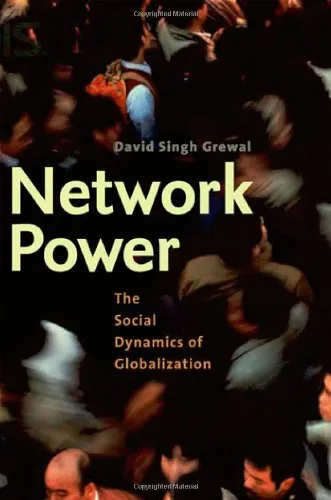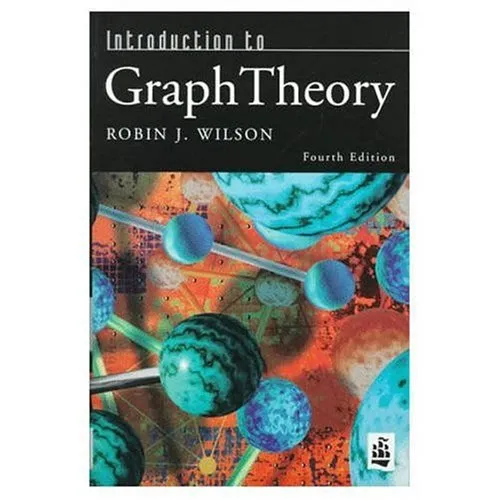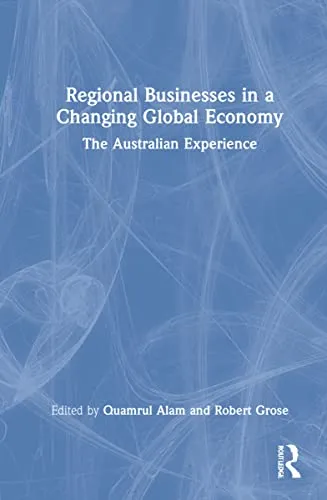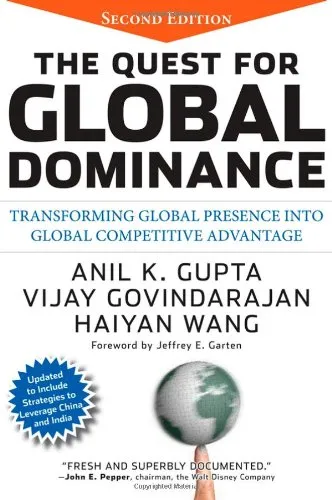Network Power: The Social Dynamics of Globalization
4.0
بر اساس نظر کاربران

شما میتونید سوالاتتون در باره کتاب رو از هوش مصنوعیش بعد از ورود بپرسید
هر دانلود یا پرسش از هوش مصنوعی 2 امتیاز لازم دارد، برای بدست آوردن امتیاز رایگان، به صفحه ی راهنمای امتیازات سر بزنید و یک سری کار ارزشمند انجام بدینکتاب های مرتبط:
معرفی کتاب Network Power: The Social Dynamics of Globalization
کتاب Network Power: The Social Dynamics of Globalization اثری برجسته و تحلیلی از David Singh Grewal است که به بررسی عمیق دینامیکهای اجتماعی جهانیشدن از زاویهای جدید و منحصربهفرد میپردازد. در این کتاب، نویسنده مفهوم جدید "Network Power" را معرفی کرده و توضیح میدهد چگونه شبکههای اجتماعی، فرهنگی، اقتصادی و سیاسی میتوانند قدرتی ناپیدا اما مؤثر بر انتخابها و رفتار جامعه جهانی اعمال کنند.
خلاصهای از کتاب
در این اثر، David Singh Grewal به مفهومی کلیدی میپردازد که به عنوان "Network Power" شناخته میشود. او استدلال میکند که گسترش استانداردها و هنجارهای جهانی در اثر گسترش شبکهها میتواند آزادی انتخاب فردی را در ظاهر افزایش دهد اما در واقع آزادی را در چارچوبی محدود هدایت میکند. به عنوان مثال، زبان انگلیسی یا سیستمهای فناوری خاص مانند پروتکلهای اینترنتی ممکن است به دلیل فواید همگانیشان به استانداردهای جهانی تبدیل شوند، اما در عین حال، افرادی را که این استانداردها را نمیپذیرند یا توانایی پذیرش آنها را ندارند، به حاشیه میرانند. این نگاه به جهانیشدن، برخلاف دیدگاههای خوشبینانه، نشاندهنده جنبههایی پیچیده و حتی گاه تاریک از تعامل جهانی است.
این کتاب در پنج فصل اصلی، علاوه بر مقدمه و نتیجهگیری، مباحث گوناگونی را بررسی میکند؛ از گسترش استانداردهای جهانی گرفته تا چالشهای اخلاقی، سیاسی و فلسفی که این فرایند با خود به همراه دارد. نویسنده با رویکردی میانرشتهای از اقتصاد، علوم اجتماعی، فلسفه و نظریههای روابط بینالمللی برای تحلیل عمیق پدیده جهانیشدن کمک میگیرد.
نکات کلیدی
- تعریف و توضیح مفهومی جدید به نام "Network Power".
- تأثیر استانداردهای جهانیشده بر فرهنگها و هویتهای بومی.
- تحلیل عوامل اجتماعی و اقتصادی ایجادکننده نابرابری در جهانیشدن.
- بررسی نقش ایدئولوژیهای غالب در شکلدهی به انتخابهای فردی و جمعی.
- رویکردی انتقادی به خوشبینی مفرط درباره تأثیرات مثبت جهانیشدن.
چند جمله معروف از کتاب
“The spread of global standards seems to represent a triumph of collective action, yet it often limits the true range of choice.”
“Network power entails its own type of coercion, not overt like physical powers but subtle, flowing through norms and standards.”
“In order to truly grasp globalization, one must understand not only its benefits but also the social constraints it imposes.”
چرا این کتاب مهم است؟
کتاب Network Power به روشن کردن مفاهیم پیچیده جهانیشدن کمک میکند و مخاطبان خود را به چالش میکشد تا درباره تأثیرات مثبت و منفی استانداردهای جهانی تأمل کنند. این اثر نه فقط برای دانشجویان و محققان علوم اجتماعی، بلکه برای تمامی کسانی که به موضوعات مرتبط با هویت، قدرت و سیاست جهانی علاقه دارند، منبعی ارزشمند است. ارائه یک چارچوب نظری برای بررسی و تحلیل جهانیشدن از منظری نو و انتقادی، بر اهمیت این کتاب میافزاید.
این اثر تأثیری پایدار بر ادبیات مرتبط با جهانیشدن داشته و به دلیل نگاه عمیق و چندلایهاش به عنوان یکی از آثار برجسته در این حوزه شناخته میشود. مهمتر از همه، این کتاب دیدگاههای رایج درباره جهانیشدن را به چالش میکشد و راهی جدید برای تفکر درباره تعاملات میان جهانبینیها و هنجارهای جهانی ارائه میدهد.
Introduction to Network Power: The Social Dynamics of Globalization
In the modern world, globalization has emerged as a powerful force that shapes economics, politics, and social interactions across the globe. Yet, this phenomenon is not as straightforward as it appears. In Network Power: The Social Dynamics of Globalization, David Singh Grewal explores the intricate mechanisms behind globalization, offering a nuanced framework to understand how and why certain norms, practices, and systems come to dominate globally.
Grewal introduces the concept of "network power" to illustrate how the choices individuals and communities make are increasingly shaped by global standards and networks. Through a deep dive into economics, culture, and politics, the book analyzes the seemingly paradoxical dynamics of globalization—its ability to create opportunities while simultaneously constraining them. It addresses key questions around how globalization's norms structure participation in global systems and whether its outcomes are truly beneficial for all.
Detailed Summary of the Book
At its core, the book offers a fresh perspective on understanding how globalization evolves through the dynamics of "network power."
Grewal’s central argument is that globalization is primarily driven by the adoption of shared standards, norms, and practices. These shared systems, such as a common language or financial standards, facilitate easier coordination and interaction. Yet, once these standards gain critical mass, they create a kind of compulsion—forcing others to join these networks or face exclusion. This phenomenon explains why globalization often feels both empowering and oppressive, as adopting widely accepted standards can open new doors while closing others.
The first half of the book is dedicated to laying down the theoretical foundations of network power. Grewal provides examples from various domains, such as international business, cultural exchanges, and technological systems. One illustrative example is the dominance of the English language, which people adopt to access global networks but may inadvertently supplant local languages and cultures.
In the latter half of the book, Grewal transitions to exploring globalization's ethical dimensions. He questions whether globalization inevitably leads to homogenization and whether new institutional frameworks can be designed to safeguard diversity. Through engaging analysis, he challenges readers to reimagine globalization as a process that can be steered toward more equitable and inclusive outcomes.
Key Takeaways
Here are some of the most important insights gained from reading this compelling book:
- Globalization operates through networks, where standards and norms gain power as more people adopt them.
- Adhering to global standards can bring benefits such as access to larger markets, but it can also diminish diversity and force people to abandon localized ways of life.
- "Network power" is not inherently good or bad but depends on how it is wielded and managed, and whether participants are given genuine choices to opt in or out of global networks.
- Ethical globalization requires rethinking institutional systems to ensure that marginalized voices are heard and incorporated into decision-making processes.
Famous Quotes from the Book
Below are some of the most resonant quotes from Network Power:
"The power of the network derives not from outright coercion but from a lack of compelling alternatives."
"Standards are the invisible scaffolding of globalization—subtle yet transformative, bringing together people while reshaping what they leave behind."
"Globalization presents a paradox: while it increases options for some, it often constrains the choices of others."
Why This Book Matters
In the vast literature on globalization, Network Power: The Social Dynamics of Globalization stands out for its unique approach and relevance to contemporary debates.
Grewal's concept of "network power" offers a much-needed analytical lens for understanding the complexity of globalization. His argument moves beyond the typical binary of globalization as good or bad, presenting it instead as a multifaceted phenomenon with both advantages and drawbacks. This balanced perspective is essential for making sense of why certain global norms take root and how their rise can be navigated ethically.
The book is particularly relevant in an era of growing inequality and cultural homogenization. As people around the world grapple with the implications of global integration—whether through economic systems, technological platforms, or linguistic hegemony—this book provides a roadmap to critically evaluate these developments. At the same time, it opens pathways for thinking about how globalization can be steered toward a more inclusive and sustainable trajectory.
Ultimately, Network Power equips readers, policymakers, and scholars with the tools to deconstruct and reshape the forces of globalization for the betterment of all.
دانلود رایگان مستقیم
شما میتونید سوالاتتون در باره کتاب رو از هوش مصنوعیش بعد از ورود بپرسید
دسترسی به کتابها از طریق پلتفرمهای قانونی و کتابخانههای عمومی نه تنها از حقوق نویسندگان و ناشران حمایت میکند، بلکه به پایداری فرهنگ کتابخوانی نیز کمک میرساند. پیش از دانلود، لحظهای به بررسی این گزینهها فکر کنید.
این کتاب رو در پلتفرم های دیگه ببینید
WorldCat به شما کمک میکنه تا کتاب ها رو در کتابخانه های سراسر دنیا پیدا کنید
امتیازها، نظرات تخصصی و صحبت ها درباره کتاب را در Goodreads ببینید
کتابهای کمیاب یا دست دوم را در AbeBooks پیدا کنید و بخرید
1244
بازدید4.0
امتیاز0
نظر98%
رضایتنظرات:
4.0
بر اساس 0 نظر کاربران
Questions & Answers
Ask questions about this book or help others by answering
No questions yet. Be the first to ask!














